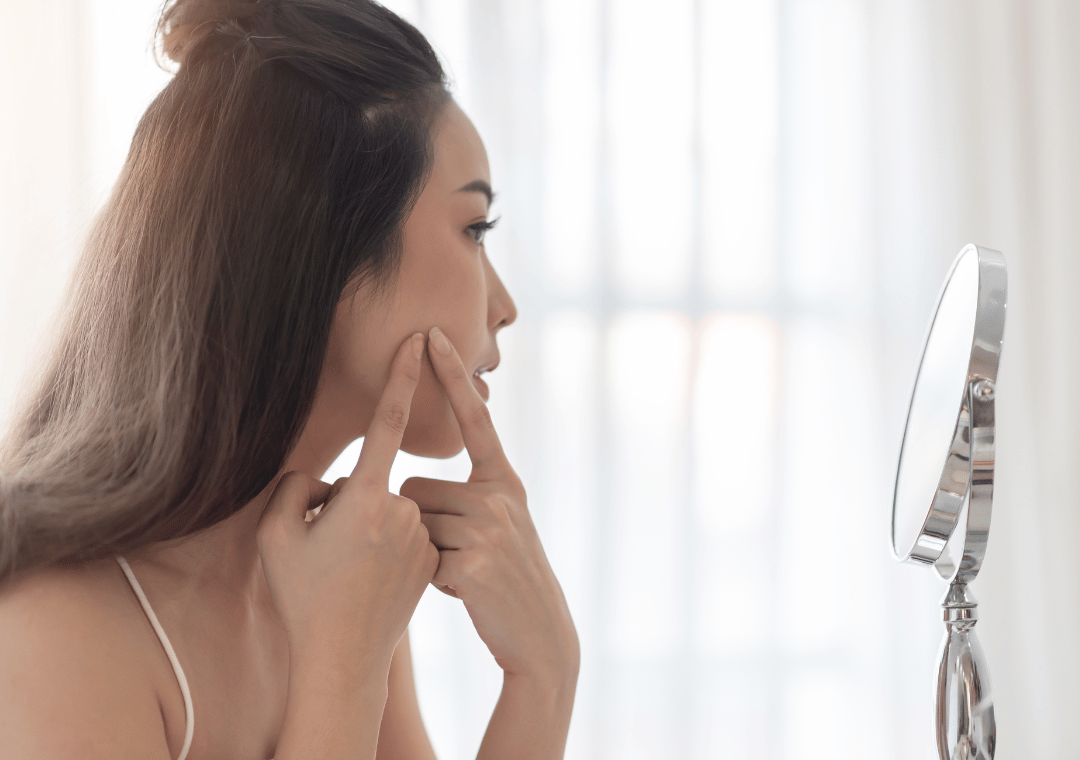Many people think that acne goes away with puberty. Unfortunately, that's not the case for most women who find themselves breaking out every month. Like everything in your body, acne can be caused by a hormonal imbalance. Let's investigate how your hormones contribute to your cystic acne and what you can do to treat your acne.
Hormone Imbalance
As a women, you produce both the female sex hormone, estrogen, and the male sex hormone, testosterone. Throughout the month, the levels of each of these hormones will vary. This hormone imbalance causes your skin to produce more oil, particularly when testosterone levels are high or estrogen levels are low. In turn, your oily skin clogs your pores and causes those unwanted breakouts.
If you have PCOS, you could be more prone to acne. Your insulin levels lead to higher testosterone levels than normal, and therefore can lead to acne.
Additionally, progesterone, another female hormone, plays a role in your acne. Estrogen aims to protect your skin, but progesterone interrupts this process. This allows sebum, an oil, thick substance to develop under your skin's surface. While this gives some women glowing skin, it gives others acne.
Other Things Causing Your Acne
Nothing in your body will be caused by just one factor, including acne. Here are some other acne causing agents:
- Genetics
- Many twin studies have been conducted to find that a significant reasoning behind acne is genetic (1).
- Diet Choices
- Studies have shown that acne can be linked with high consumption of carbohydrates and dairy products (2)
- Stress
- while the reasoning is not yet known, studies on college students have proven that acne flare ups are associated with stress, when comparing students during exam week to a non-stressful period (3).
Ways To Fight Your Acne
Here’s some tips to get your hormones in check and fight your cystic acne:
- Start taking a daily probiotic
- Here at BINTO, we know that a probiotic works to get your hormones in check. That’s why we include it in our customized support kits. Not only will the probiotic work to treat your acne, but it will also promote gut health and balance your hormones.
- Change to natural products
- We support using all natural and organic products, and that doesn’t stop with our tampons and supplements. Find skin care products that are natural to ensure you are putting the safest ingredients on your skin. Natural remedies to help with acne include tea tree oil, creating a calming skin routine (use products with no irritants), and taking supplements with vitamin A and zinc.
- Talk with your dermatologist
- If you notice that your acne is severe, take time to see a dermatologist. They can help you find the right skin care regimen and medicine to help fight your acne.
Sources:
- Bataille, V., H. Snieder, A. J. MacGregor, P. Sasieni, and T. D. Spector. "The Influence of Genetics and Environmental Factors in the Pathogenesis of Acne: A Twin Study of Acne in Women." The Journal of Investigative Dermatology. U.S. National Library of Medicine, Dec. 2002. Web. <https://www.ncbi.nlm.nih.gov/pubmed/12485434>.
- "Growing Evidence Suggests Possible Link between Diet and Acne." American Academy of Dermatology. N.p., 8 Feb. 2013. Web. <https://www.aad.org/media/news-releases/growing-evidence-suggests-possible-link-between-diet-and-acne>.
- Yosipovitch, G., M. Tang, A. G. Dawn, M. Chen, C. L. Goh, Y. Huak, and L. F. Seng. "Study of Psychological Stress, Sebum Production and Acne Vulgaris in Adolescents." Acta Dermato-venereologica. U.S. National Library of Medicine, 2007. Web. <https://www.ncbi.nlm.nih.gov/pubmed/17340019>.

